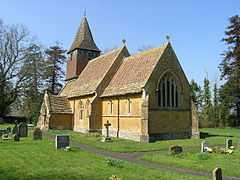West Bradley
Coordinates: 51°07′34″N 2°38′14″W / 51.12604°N 2.63727°W
West Bradley is a village and civil parish 4 miles south-east of Glastonbury in the Mendip district of Somerset, England. The parish includes the hamlets of Hornblotton and Lottisham.
Hornblotton is a traditional English community with a small village hall. There are no shops in Hornblotton although there are a number of farms, principally Higher Farm, which produces cider and apples. The village is on the Monarch's Way long-distance footpath.
History
Bradley comes from Old English and means the broad clearing or wood.[2]
The manor of Bradley was given to Glastonbury Abbey in 746 by Ethelbald, King of Mercia, and held it until the dissolution of the monasteries in 1539.[2]
The parish of West Bradley was part of the hundred of Glaston Twelve Hides, while Hornblotton was part of the Whitstone Hundred.[3]
Governance
The parish council has responsibility for local issues, including setting an annual precept (local rate) to cover the council’s operating costs and producing annual accounts for public scrutiny. The parish council evaluates local planning applications and works with the local police, district council officers, and neighbourhood watch groups on matters of crime, security, and traffic. The parish council's role also includes initiating projects for the maintenance and repair of parish facilities, as well as consulting with the district council on the maintenance, repair, and improvement of highways, drainage, footpaths, public transport, and street cleaning. Conservation matters (including trees and listed buildings) and environmental issues are also the responsibility of the council.
The village falls within the Non-metropolitan district of Mendip, which was formed on 1 April 1974 under the Local Government Act 1972, having previously been part of Shepton Mallet Rural District,[4] which is responsible for local planning and building control, local roads, council housing, environmental health, markets and fairs, refuse collection and recycling, cemeteries and crematoria, leisure services, parks, and tourism.
Somerset County Council is responsible for running the largest and most expensive local services such as education, social services, libraries, main roads, public transport, policing and fire services, trading standards, waste disposal and strategic planning.
It is also part of the Wells county constituency represented in the House of Commons of the Parliament of the United Kingdom. It elects one Member of Parliament (MP) by the first past the post system of election, and part of the South West England constituency of the European Parliament which elects seven MEPs using the d'Hondt method of party-list proportional representation.
Landmarks
The Court Barn was built in the 15th century as a Tithe barn for Glastonbury Abbey, and was restored in the early 20th century.[5]
Lottisham Manor dates from the 15th century.[6] Bradley House is slightly later having been built in the 16th and 17th centuries.[7] It was completed in 1726 by Col William Piers and included ornamental canals in the grounds.[2]
Near the church in Hornblotton is Hornblotton House, a large country mansion with substantial outbuildings and a large lake.
Religious sites
The Anglican parish Church of St Andrew dates predominantly from the 14th and 15th centuries, but underwent extensive restoration in the 19th century.[8]
The parish Church of St Mary in Lottisham was built in 1876 by Sir T. G. Jackson. It is a Grade II* listed building.[9]
The Church of St Peter in Hornblotton was built in 1872–74 by Sir Thomas Graham Jackson, for the rector, Geoffrey Thring. It is a Grade I listed building,[10] and features one of the first electric clocks produced.
References
- ↑ "West Bradley Parish". Neighbourhood Statistics. Office for National Statistics. Retrieved 1 January 2014.
- ↑ 2.0 2.1 2.2 Bush, Robin (1994). Somerset: The Complete Guide. Dovecote Press. p. 212. ISBN 1-874336-26-1.
- ↑ "Somerset Hundreds". GENUKI. Retrieved 22 October 2011.
- ↑ "Shepton Mallet RD". A vision of Britain Through Time. University of Portsmouth. Retrieved 4 January 2014.
- ↑ "Court Barn". Images of England. English Heritage. Retrieved 8 February 2009.
- ↑ "Lottisham Manor". Images of England. English Heritage. Retrieved 8 February 2009.
- ↑ "Bradley House". Images of England. English Heritage. Retrieved 8 February 2009.
- ↑ "Church of St Andrew". Images of England. English Heritage. Retrieved 8 February 2009.
- ↑ "Church of St Mary". Images of England. Retrieved 26 November 2006.
- ↑ "Church of St Peter". Images of England. English Heritage. Retrieved 4 October 2008.
External links
![]() Media related to West Bradley at Wikimedia Commons
Media related to West Bradley at Wikimedia Commons


